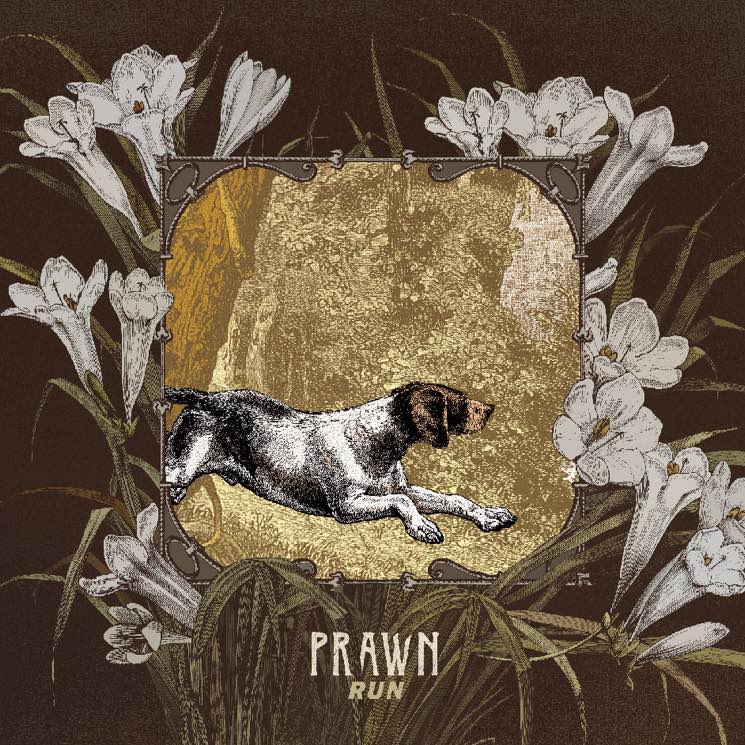New Jersey's Prawn made one of the more underappreciated indie-rock records of 2014 with their second full-length effort Kingfisher. That album was crisp, clean and full of life, yet went relatively unnoticed next to other releases that year by comparable acts like the Hotelier and Pianos Become the Teeth. Taking the spirit of post-rock and applying the energy of punk and the sentiment of Mineral-style emo to it, the mid-Atlantic band named after shrimp and similar crustaceans stay the path on their third album, Run — though with a rougher edge.
For one thing, Run doesn't have the brass horn sections or string arrangements that cropped up here and there throughout Kingfisher, part of what made it such a treat. While that does mean that what's on record is more faithful to what the band are able to perform live, it also strips away cherished layers from their sound.
Those are missed, but their absence isn't a dealbreaker, as the band's fundamentals are still strong. While guitarists Tony Clark and Kyle Burns riff between twinkly, chiming parts and brawny, sludgy measures, the rhythm section — drummer Jamie Houghton and particularly bassist Ryan McKenna — adds a fair bit of pizzazz tucked neatly underneath. Run is rocky, lively and proficiently performed, yet Prawn choose their hushed, melodic moments wisely and know when to do more with less.
"North Lynx" best embodies that dynamic, keeping things light and flighty for several minutes while building suspense, before packing a wallop of an ending. "Leopard's Paw" is another song of extremes; while it comprises the album's quietest and smoothest moments, it also reaches an apex at which Clark pushes himself to his vocal limits amid celestial guitars, all while the bass and drums rumble and roar below. The strength of "Snake Oil Salesman" and "Greyhound," meanwhile, hinges on their upbeat hooks; the two songs come off as each other's emotional counterpoint, with the former descending into the depths of despair and distrust while the latter rises to cheery refrains about freedom and (reluctant) release.
On an album that largely centres on resisting isolation and alienation, trying to free oneself from the grip of anxieties and self-doubt, finding a way to express oneself and, in turn, opening up to the many other ideas and perspectives in one's surroundings, the songs fall along a fitting range between hopeless and hopeful. Run can sometimes feel like Prawn are resisting an urge to explode — yet doing so could be what pushes this group over the edge. It's not necessarily a new high point for the nearly ten-year-old band, but it's certainly no sign of decline, either.
(Topshelf Records)For one thing, Run doesn't have the brass horn sections or string arrangements that cropped up here and there throughout Kingfisher, part of what made it such a treat. While that does mean that what's on record is more faithful to what the band are able to perform live, it also strips away cherished layers from their sound.
Those are missed, but their absence isn't a dealbreaker, as the band's fundamentals are still strong. While guitarists Tony Clark and Kyle Burns riff between twinkly, chiming parts and brawny, sludgy measures, the rhythm section — drummer Jamie Houghton and particularly bassist Ryan McKenna — adds a fair bit of pizzazz tucked neatly underneath. Run is rocky, lively and proficiently performed, yet Prawn choose their hushed, melodic moments wisely and know when to do more with less.
"North Lynx" best embodies that dynamic, keeping things light and flighty for several minutes while building suspense, before packing a wallop of an ending. "Leopard's Paw" is another song of extremes; while it comprises the album's quietest and smoothest moments, it also reaches an apex at which Clark pushes himself to his vocal limits amid celestial guitars, all while the bass and drums rumble and roar below. The strength of "Snake Oil Salesman" and "Greyhound," meanwhile, hinges on their upbeat hooks; the two songs come off as each other's emotional counterpoint, with the former descending into the depths of despair and distrust while the latter rises to cheery refrains about freedom and (reluctant) release.
On an album that largely centres on resisting isolation and alienation, trying to free oneself from the grip of anxieties and self-doubt, finding a way to express oneself and, in turn, opening up to the many other ideas and perspectives in one's surroundings, the songs fall along a fitting range between hopeless and hopeful. Run can sometimes feel like Prawn are resisting an urge to explode — yet doing so could be what pushes this group over the edge. It's not necessarily a new high point for the nearly ten-year-old band, but it's certainly no sign of decline, either.
